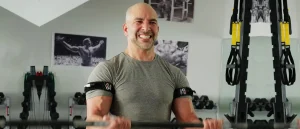I Coach Men in Midlife Crisis. Here’s My Best Advice.
Psychoanalyst and social scientist Elliot Jacques coined the phrase “midlife crisis” in 1965 to capture the shift in identity and self-confidence that often occurs in our 40s and 50s. And let’s get real: For men, that midlife stage can feel pretty sucky. Maybe you’re gaining weight and losing energy. You might feel anxious or depressed. You might have resentment or remorse about things that happened in your past—and worry that the future won’t be any better.
I know those stuck feelings. In my early 40s I was a successful, financially secure entrepreneur with a great family. But as I reached my mid 40s, I began to struggle. I lacked energy. I wasn’t sleeping well. I was stressed at work. I wasn’t recovering from my workouts the same way I had in the past. I felt trapped. I worried that I’d always have to grind to keep my professional and financial success. Personally, emotionally, and spiritually, I wasn’t fulfilled.
I thought of my own father, who had died at 47. I was determined to make the most of the years I had left.
After consulting with my doctor, I started testosterone replacement therapy. That helped, but it was far from the only change I made. I scaled back my high-pressure career to put more energy into my passions: entrepreneurship, fitness, writing, podcasting, travel, and my family.
Today, I’m a performance coach that helps other men maximize middle age. Through one-on-one coaching sessions, a weekly podcast, and a newsletter, I help men get out of midlife crisis mode so that they can embrace what I’ve learned: That the middle is the sweet spot. The middle is where the magic happens.
As I told members of the Hone Community in a recent AMA, the middle is the beginning of the next and best phase of your life.
Are You Having a Midlife Crisis?
There’s no official diagnosis for “male midlife crisis,” and what feels like a fully-fledged crisis to one guy might be considered a stressful but manageable event to another.
In movies, male midlife crisis is a stereotype: a guy facing his own mortality who ditches his wife and car for younger models. But in real life, you might be hitting some of the same issues I was—feeling drained and depleted, time-poor, stressed, and unfulfilled.
When these types of emotional crises happen, our behavior often changes. According to the American Psychological Association, behavior changes related to an emotional crisis can include:
- Neglect of personal hygiene
- Dramatic changes in sleep habits
- Weight loss or gain
- Pronounced changes in mood, such as increased anger, irritability, sadness, or anxiety.
- Withdrawal from usual routine or relationships
The most common things that I see from guys struggling with middle age are complacency, conformity, and redundancy.
The most common things that I see from guys struggling with middle age are complacency, conformity, and redundancy. They got on a life path and now they’re 10 or 20 years down the road with a family, a career that might not be all they thought it was cracked up to be, and mountains of stress and anxiety. They have no balance, and no fun in their lives. When a new client comes to me with these concerns, here are three things I suggest to help him start to shift his mindset and his energy.
My Top Advice For Men in Midlife Crisis
Utilize Your Calendar
Your calendar is probably packed with shit you do for other people: Meetings, activities and appointments for your kids, social outings you would be happy to miss. We underestimate what we can do in a year and we overestimate what we can do in a day, so we jam pack our days—and then we burn out on it.
To break that cycle, build space in your calendar to put yourself first. Schedule your workouts. Schedule some empty and open space. Schedule your family time. Schedule the hobbies and activities and trips and events that you want to be a part of. Then, schedule your other obligations, your professional obligations, those other things that you need to do in order to allow you to do those things that you scheduled on your calendar. Be consistent and disciplined about this so that it becomes routine.
When you intentionally put yourself first—without feeling guilty about it—it becomes part of your overall life picture. You’ll feel more empowered and will be amazed at how much energy starts to enter your life.
If you start to feel like you’re running out of time, go back and see which of those obligations and commitments you can cut. You’ll be surprised at the things you think you have to do, have been doing that you really don’t. You just have to have the resolve to break the pattern.
Nothing to cut? See where you can combine tasks. Can’t find time to take a walk because you have to be on a call? Walk and talk. People will be fine with it. Shift your dinners and networking to mornings and sweatworking. Drink your coffee while you meditate; it’ll never taste better.
Combine Your Profession and Your Passion
I’m so tired of the “Follow your passion” at all costs noise. It’s galactically irresponsible to just up and quit something when you’re in midlife, have a wife, family, significant overhead, responsibilities. Plus, the grass might not be greener somewhere else!
That’s what I discovered. I’m a fitness enthusiast, and when I opened a gym I was in the best shape of my life. I thought it was the perfect way to follow my passion. But I could never quite figure out the model, get aligned with my partners, or manage the team properly. When I sold it, I was in the worst shape I’d been in in 10 years, physically and mentally.
What’s worked better for me: combining my profession with my passion. When I sold the gym I started selling insurance. Today, insuring the fitness company I love is more gratifying, less risk and as much reward as starting one up. I get to go visit, be a part of their professional service team and then leave all the pressures of entrepreneurship and “owning” a business to their founder. I have no business overhead, no team to manage, no investors to report to.
You may need to shift careers to make this magic combination—but you might not have to. A good first start is to see if you can make your current job more aligned and fun while you’re there. If you are passionate about connecting with people but are stuck in a job entering data into spreadsheets all day, see if you can transfer to a more client-facing department. If teaching people new skills gets your motor running, ask if you can mentor new hires. Those changes may not be enough to really align your passions with your career, but it’s a great first start.
Don’t Go All In
Too often a “new beginning” makes people feel like they need to take drastic steps. But change doesn’t happen overnight. When I was feeling stuck, the one thing I knew was that whatever I was doing wasn’t working. So I adopted a “What if” mentality to my daily actions, activities and mindset.
For example: I’d think, “What if I went for a walk this morning?” and then I did it. Or, “What if I didn’t respond to emails immediately and reactively?” and then I’d wait 24 hours before replying to the flood in my inbox.
I applied the same approach to bigger mindset shifts: “What if I wrote down my big life goals and vision and reverse engineered how I could achieve them as opposed to just going through the motions of my daily to do list?” “What if I leaned in and accepted that I needed help; physically, emotionally, financially, spiritually, professionally and personally and then I invested heavily in finding those who could help me?”
I also find taking baby steps is a great way to kickstart long-term change. If you drink; don’t give up booze. Have one less, then two less. If you’re eating crap every meal, eat healthier for one meal, then another and so on. See how you feel. If you haven’t exercised in years, don’t hit the boot camp on day one. Take a walk instead. Then go little farther the next day. Then add in some bodyweight movements. Every fitness routine imaginable is available online for free. Consistency is key.
Once I began to take small positive action steps each day and started playing the long game instead of seeking instant gratification, my life improved dramatically. My energy increased, my productivity improved, my finances grew and my smile returned. By doing less with more focus, I was able to achieve far more than when I was able to when I was redlining it 24/7 and bought into the hustle and grind lifestyle.
Expand your social circle
When I stopped drinking and going to poker nights because I decided I wanted to have energy to workout in the morning or go coach my kids’ sport teams instead, I stopped getting invited to those things. I felt very lonely and very much the outlier. I’d walk by the conference room at five o’clock at night in our office and see six or seven guys sitting around the conference table, laughing, talking, opening up the liquor cabinet and staying there until seven or eight at night.
I made the mistake of asking those guys to do some new activities I was getting involved in. Do you know how lonely I felt when I would invite guy after guy, after guy, after guy to do things with me? And all I would hear was, no, no, no, no, no. I tried that for years.
I was inviting all the wrong people to the wrong thing. It’s like inviting a vegetarian to a steakhouse. It doesn’t work. But when I started inviting the right people to the right things, it became effortless.
You’ll feel some loneliness as you start making authentic connections within the lifestyle you want to live. But if you put the energy and the effort into finding people that align with what works for you, the friendships you make will be even stronger than those you’ve outgrown.










